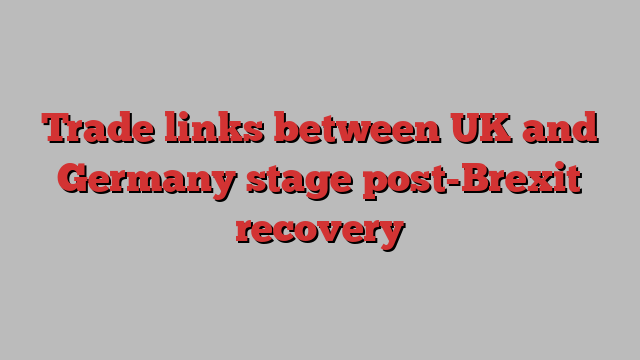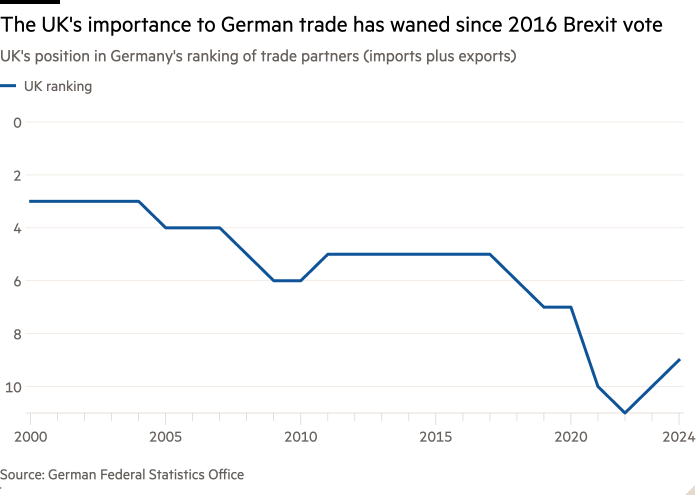
Stay informed with free updates
Simply sign up to the EU trade myFT Digest — delivered directly to your inbox.
Trade between the UK and Germany, Europe’s largest economy, is beginning to recover from the decline that set in after Brexit, providing welcome news to Britain’s government as it seeks to reset relations with Europe.
Official figures seen by the Financial Times show that the UK was Germany’s ninth-biggest trading partner over most of the first half of this year. It fell to 11th in 2022 — its lowest level since records began — amid frictions caused by Brexit, which was finalised in January 2020, and ranked tenth in 2023.
Imports and exports between the UK and Germany totalled €49.5bn between January and May this year, figures provided to the FT by the federal statistics agency show. The US was in first place with €106.9bn, followed by China with €102.3bn.
Ulrich Hoppe, director-general at the German-British Chamber of Industry & Commerce, said trade was “back on an upward trajectory”, largely thanks to “a bit of a post-Brexit adjustment”. He noted an increase in exports of German-made cars into the UK market.
But he cautioned that “there is still some catching up to do”, adding that it was “too early to judge the longer-term trend”.

In 2015, the year before the Brexit vote, the UK ranked fifth in the list of Germany’s trading partners, which adds up total imports and exports. In 2019, before the Brexit deal was applied and trade restrictions entered into force, the UK was Germany’s seventh biggest.
The latest trade numbers will be welcome news for Sir Keir Starmer, UK prime minister, as he tries to rebuild Britain’s strained relationship with Europe.
Starmer has ruled out a return to the EU’s single market or customs union, as well as to the bloc’s freedom of movement regime. But he and his ministers “see scope for much greater co-operation with the EU without technically breaching these red lines”, said Mujtaba Rahman, managing director at Eurasia.
This month’s meeting of the European Political Community, which Starmer hosted at Blenheim Palace, “proved a perfect platform” for him to begin this reset in relations, Rahman said.
On Wednesday, during a trip to Berlin by John Healey, UK defence minister, Britain and Germany signed what they said was their most comprehensive defence co-operation agreement in decades, pledging to urgently reintegrate the UK’s defence industry into European supply chains.
Officials in Berlin attribute some of the pick-up in trade to the beneficial effects of the Windsor framework, an agreement Starmer’s predecessor Rishi Sunak negotiated with the EU last year, which ironed out some of the trade frictions created by Brexit. “Windsor has changed the mood music and enabled better communication,” said Hoppe.
Others questioned that assessment. “I’m not convinced there’s really been a turnaround,” said Nicolai von Ondarza of the German Institute for International and Security Affairs. “The Windsor framework eased the situation politically but I’m not sure it really affected corporate investment and trade decisions to a significant extent.”
Experts blamed the gradual decoupling of the UK manufacturing sector from the single market, following Britain’s withdrawal from the EU, for the trading relationship reaching its nadir in 2022. Bilateral trade suffered as companies struggled with the additional red tape triggered by Brexit.
But in recent months, German officials say, relations seem to be improving, a trend exemplified by the UK’s readmission into the Horizon Europe research collaboration programme last year, and recent UK-German partnerships on hydrogen and on energy and climate.
They say German companies have also been encouraged by the UK government’s interest in concluding a veterinary agreement with the EU, which would ease checks on agrifood products at the border, and in a deal on the mutual recognition of professional qualifications.